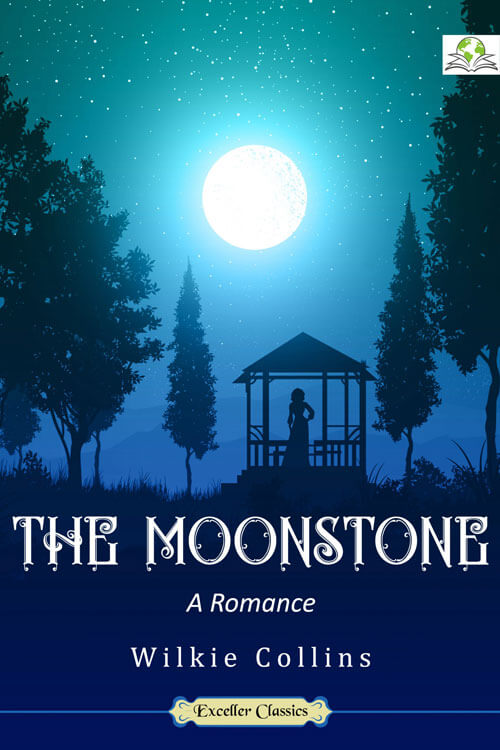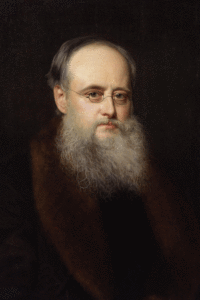
The Moonstone
Having overcome my difficulties with the ladies, I found more problems waiting for me when I went back to my room. Penelope, with the natural sweetness of women, came in to kiss and make it up again and—with the natural curiosity of women—to ask another question. This time, she only wanted me to tell her what was the matter with our second housemaid, Rosanna Spearman.
It appeared that after leaving Mr. Franklin and me at the Shivering Sand, Rosanna had returned to the house in a very unaccountable state of mind. She had turned (if Penelope was to be believed) all the colours of the rainbow. She had been merry without reason and sad without reason. In one breath, she asked hundreds of questions about Mr. Franklin Blake, and in another breath, she had been angry with Penelope for assuming that a strange gentleman could possess any interest in her. She had been surprised, smiling and scribbling Mr. Franklin’s name inside her workbox. She had been surprised again, crying and looking at her deformed shoulder in the glass. Had she and Mr. Franklin known anything of each other before today? Quite impossible! Had they heard anything of each other? Impossible again! I could speak to Mr Franklin’s genuine astonishment when he saw how the girl stared at him. Penelope could talk to the girl’s curiosity as authentic when she asked questions about Mr. Franklin. The conference between us, conducted in this way, was tiresome enough until my daughter suddenly ended it by bursting out with what I thought was the most monstrous supposition I had ever heard.
Read or download Book
Wilkie Collins
William Wilkie Collins (8 January 1824 – 23 September 1889) was an English novelist and playwright known especially for The Woman in White (1859), a mystery novel and early sensation novel, and for The Moonstone (1868), which established many of the ground rules of the modern detective novel and is also perhaps the earliest clear example of the police procedural genre.
Born to the London painter William Collins and his wife, Harriet Geddes, he moved with them to Italy when he was twelve, living there and in France for two years, learning both Italian and French. He worked initially as a tea merchant. After his first novel, Antonina, was published in 1850, Collins met Charles Dickens, who became his friend and mentor. Some of Collins’ work appeared in Dickens’ journals Household Words and All the Year Round. They also collaborated on drama and fiction. Collins gained financial stability and an international following by the 1860s. Still, in the 1870s and 1880s, after becoming addicted to the opium he took for his gout, the quality of both his health and his writing declined.
Collins criticised the institution of marriage. He had relationships with two women: widow Caroline Graves – living with her for most of his life, treating her daughter as his – and the younger Martha Rudd, with whom he had three children.
Early life
Collins was born at 11 New Cavendish Street, London, the son of William Collins, a well-known Royal Academician landscape painter, and his wife, Harriet Geddes. Named after his father, he soon became known by his middle name, which honoured his godfather, the painter David Wilkie. The family moved to Pond Street, Hampstead, in 1826. In 1828, Collins’s brother, Charles Allston Collins, was born. Between 1829 and 1830, the Collins family moved twice, first to Hampstead Square and then to Porchester Terrace, Bayswater. Wilkie and Charles received their early education from their mother at home. The Collins family were deeply religious, and Collins’s mother enforced strict church attendance on her sons, which Wilkie disliked.
In 1835, Collins began attending school at the Maida Vale Academy. From 1836 to 1838, he lived with his parents in Italy and France, which made a great impression on him. He learned Italian while in Italy and began learning French, where he would eventually become fluent. From 1838 to 1840, he attended the Reverend Cole’s private boarding school in Highbury, where he was bullied. One boy forced Collins to tell him a story every night before allowing him to go to sleep. “It was this brute who first awakened in me, his poor little victim, a power of which but for him I might never have been aware…. When I left school, I continued storytelling for pleasure,” Collins later said.
In 1840, the family moved to 85 Oxford Terrace, Bayswater. In late 1840, Collins left school at nearly 17 and was apprenticed as a clerk to the tea merchants Antrobus & Co. firm, owned by a friend of Wilkie’s father. He disliked clerical work but worked for the company for over five years.
Collins started writing and published his first story, “The Last Stage Coachman”, in the Illuminated Magazine in August 1843. In 1844, he travelled to Paris with Charles Ward. That same year, he wrote his first novel, Iolani, or Tahiti as It Was; a Romance, submitted to Chapman and Hall but rejected in 1845. The story remained unpublished during his lifetime. Collins said, “My youthful imagination ran riot among the noble savages, in scenes which caused the respectable British publisher to declare that it was impossible to put his name on the title page of such a novel.” While Collins wrote this novel, his father learned that his son would not follow him in becoming a painter.
William Collins had intended his first son to become a clergyman and was disappointed in Wilkie’s lack of interest in the profession. At his father’s insistence, Collins instead entered Lincoln’s Inn in 1846 to study law; his father wanted him to have a steady income. Collins showed only a slight interest in law and spent most of his time with friends and working on a second novel, Antonina, or the Fall of Rome. After his father died in 1847, Collins produced his first book, Memoirs of the Life of William Collins, Esq., R. A., published in 1848.
The family soon moved to 38 Blandford Square, where they used their drawing room for amateur theatricals. In 1849, Collins exhibited a painting, The Smugglers’ Retreat, at the Royal Academy summer exhibition. Richard Bentley published Antonina in February 1850. Collins went on a walking tour of Cornwall with artist Henry Brandling in July and August 1850. He completed his legal studies and was called to the bar in 1851. Though he never formally practised, he used his legal knowledge in many novels.
Early writing career
An instrumental event in his career was an introduction in March 1851 to Charles Dickens by a mutual friend, the painter Augustus Egg. They became lifelong friends and collaborators. Collins acted with Dickens in Edward Bulwer-Lytton’s play Not So Bad As We Seem in May that year. Queen Victoria and Prince Albert were among the audience members. Collins’s story “A Strange Bed”, his first contribution to Dickens’s journal Household Words, was published in April 1852. In May 1852, he went on tour with Dickens’s company of amateur actors, again performing Not So Bad As We Seem, but with a more substantial role.
Bentley published Collins’s novel Basil in November. During the writing of Hide and Seek in early 1853, Collins suffered what was probably his first attack of gout, a condition from which he would suffer for the rest of his life. He was ill from April to early July. After that, he stayed with Dickens in Boulogne from July to September 1853, then toured Switzerland and Italy with Dickens and Egg from October to December. Collins published Hide and Seek in June 1854.
During this period, Collins extended the variety of his writing, publishing articles in George Henry Lewes’s paper The Leader, short stories and essays for Bentley’s Miscellany, dramatic criticism and the travel book Rambles Beyond Railways. His first play, The Lighthouse, was performed by Dickens’s theatrical company at Tavistock House in 1855. His first collection of short stories, After Dark, was published by Smith, Elder in February 1856. His novel A Rogue’s Life was serialised in Household Words in March 1856. Around then, Collins began using laudanum regularly to treat his gout. He became addicted and struggled with that problem later in life.
Collins joined the staff of Household Words in October 1856. In 1856–57, he collaborated closely with Dickens on a play, The Frozen Deep, first performed in Tavistock. Collins’s novel The Dead Secret was serialised in Household Words from January to June 1857 before being published by Bradbury and Evans in volume form. Collins’s play The Lighthouse was performed at the Olympic Theatre in August. His account, The Lazy Tour of Two Idle Apprentices, based on Dickens’s and Collins’s walking tour in the north of England, was serialised in Household Words in October 1857. In 1858, Collins collaborated with Dickens and other writers on the story “A House to Let”.






